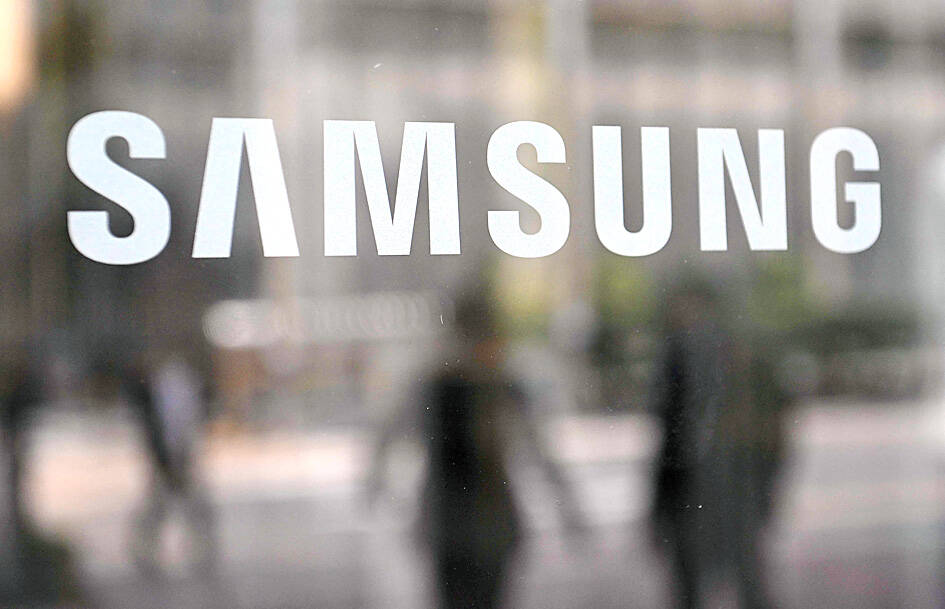Samsung Electronics Co yesterday issued a rare apology and acknowledged it was facing a “crisis” over its technological competitiveness, reflected in a disappointing profit guidance, despite a global artificial intelligence (AI) boom.
The company expects third-quarter profits to rise to 9.1 trillion won (US$6.8 billion), up 274.5 percent from a year earlier, but falling short of market expectations as the company struggles to leverage robust demand for the chips used in AI servers.
“Today, we, the management of Samsung Electronics, would like to first say sorry to you,” Samsung said in a statement signed by Jun Young-hyun, the vice chairman of its device solutions division.

Photo: AFP
“Concerns have arisen about our fundamental technological competitiveness and the future of the company” because of the results, it said.
“Our management will take the lead in overcoming the crisis... We will make the serious situation we are currently facing an opportunity for a resurgence,” it said.
The results are up about three-fold from the same period last year, but down nearly 13 percent from the previous quarter.
The rare apology came about a week after the tech giant said it intended to reduce staff in some of its operations in Asia, describing the move as “routine workforce adjustments.”
Bloomberg reported that the layoffs could affect about 10 percent of the workforce in those markets, while other reports claimed the planned move could affect up to 30 percent of overseas employees at some operations.
Samsung has been lagging behind South Korea’s SK Hynix Inc when it comes to high-bandwidth memory (HBM) chips used in AI chipsets, which could be one of the biggest causes of the profit estimate released yesterday, Sejong University business professor Kim Dae-jong said in Seoul.
“Given the circumstances, it appears that Samsung has also lost a significant number of [HBM-related] employees to SK Hynix,” Kim said.
The company is facing a “grave situation,” he added.
Samsung shares fell 1.15 percent in Seoul yesterday, with its stock down almost 30 percent over the past six months.
The Samsung statement said management would “quickly assess and make any necessary adjustments to our workplace culture.”
Counterpoint Research senior analyst Jene Park said there had been “an expected decline” in Samsung’s memory sector, with delays in supply of the newest chips and general reductions in memory demand.
Even so, a sharp profit or sales decline was unlikely in the near future, he said.
“Samsung plays a significant role in the global supply chain,” Park said.
The company sees third-quarter sales rising 17.2 percent year-on-year to 79 trillion won.
It is expected to release its final earnings report at the end of this month.

WEAKER ACTIVITY: The sharpest deterioration was seen in the electronics and optical components sector, with the production index falling 13.2 points to 44.5 Taiwan’s manufacturing sector last month contracted for a second consecutive month, with the purchasing managers’ index (PMI) slipping to 48, reflecting ongoing caution over trade uncertainties, the Chung-Hua Institution for Economic Research (CIER, 中華經濟研究院) said yesterday. The decline reflects growing caution among companies amid uncertainty surrounding US tariffs, semiconductor duties and automotive import levies, and it is also likely linked to fading front-loading activity, CIER president Lien Hsien-ming (連賢明) said. “Some clients have started shifting orders to Southeast Asian countries where tariff regimes are already clear,” Lien told a news conference. Firms across the supply chain are also lowering stock levels to mitigate

IN THE AIR: While most companies said they were committed to North American operations, some added that production and costs would depend on the outcome of a US trade probe Leading local contract electronics makers Wistron Corp (緯創), Quanta Computer Inc (廣達), Inventec Corp (英業達) and Compal Electronics Inc (仁寶) are to maintain their North American expansion plans, despite Washington’s 20 percent tariff on Taiwanese goods. Wistron said it has long maintained a presence in the US, while distributing production across Taiwan, North America, Southeast Asia and Europe. The company is in talks with customers to align capacity with their site preferences, a company official told the Taipei Times by telephone on Friday. The company is still in talks with clients over who would bear the tariff costs, with the outcome pending further

Six Taiwanese companies, including contract chipmaker Taiwan Semiconductor Manufacturing Co (TSMC, 台積電), made the 2025 Fortune Global 500 list of the world’s largest firms by revenue. In a report published by New York-based Fortune magazine on Tuesday, Hon Hai Precision Industry Co (鴻海精密), also known as Foxconn Technology Group (富士康科技集團), ranked highest among Taiwanese firms, placing 28th with revenue of US$213.69 billion. Up 60 spots from last year, TSMC rose to No. 126 with US$90.16 billion in revenue, followed by Quanta Computer Inc (廣達) at 348th, Pegatron Corp (和碩) at 461st, CPC Corp, Taiwan (台灣中油) at 494th and Wistron Corp (緯創) at

NEGOTIATIONS: Semiconductors play an outsized role in Taiwan’s industrial and economic development and are a major driver of the Taiwan-US trade imbalance With US President Donald Trump threatening to impose tariffs on semiconductors, Taiwan is expected to face a significant challenge, as information and communications technology (ICT) products account for more than 70 percent of its exports to the US, Chung-Hua Institution for Economic Research (CIER, 中華經濟研究院) president Lien Hsien-ming (連賢明) said on Friday. Compared with other countries, semiconductors play a disproportionately large role in Taiwan’s industrial and economic development, Lien said. As the sixth-largest contributor to the US trade deficit, Taiwan recorded a US$73.9 billion trade surplus with the US last year — up from US$47.8 billion in 2023 — driven by strong